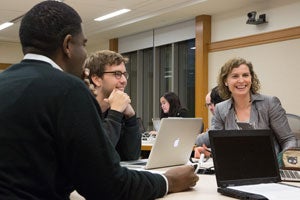The buzz in the classroom was palpable. About 20 Harvard Law students were huddled in small groups, tasked with formulating an action plan to deal with leaked evidence of the CIA’s sabotage of a North Korean nuclear missile test. The sabotage had claimed the lives of dozens of North Korean scientists and workers; the revelation that it was perpetrated by the U.S. could lead to war between the two countries.
The session and the hypothetical case the students were discussing was part of Information Law and Policy: Advanced Problem Solving Workshop, an innovative class taught this fall by Visiting Professor Susan Crawford, involving a team-based approach to delving deeply into information law, intellectual property and cyberlaw.
Based on a workshop taught for the first time last spring by Professor Jonathan Zittrain ’95 and John Palfrey ’01, the class presents students with several case studies and asks them to complete team exercises, which include conducting negotiations, writing legal briefs, and drafting policies and legislation. Readings prepare the students to carry out the exercises, while lectures and Q&A sessions with guest speakers help summarize and solidify the concepts.
The idea, said Zittrain, is “for students to inhabit the roles of people dealing with intractable issues in a way that was larger than just a doctrinal presentation—to ask: ‘what does this person, company, or government want to do and what legal and technological tools do they have to make this change?’”
Crawford’s students had spent previous classes developing a responsible leaking policy in reaction to Wikileaks’ release of U.S. State Department diplomatic cables. That evening, Crawford reconvened the students in a Wasserstein Hall classroom (one of several in the new WCC building that were designed with group work and fluid teaching strategies in mind) and asked each team to describe how they would respond to the dilemma. In the next session, guest speakers, including a former member of the State Department and the general counsel of The New York Times, would weigh in on the students’ work and share their recollections of the Wikileaks incident.
“The topics we explore in this class, such as WikiLeaks and Viacom v. YouTube, are fascinating,” said Anna Yunan Yuan, a 2L student originally from China, who feels that the course is effectively preparing her for a career in IP prosecution and litigation. “It helps me understand the landscape of information law, the current hot topics, and the various major players that we need to take into account while making the policies,” said Yuan. “It introduces me to the actual people who are out there solving these problems. It lets me team up and work with passionate and smart classmates. It improves my teamwork, speaking, and negotiation skills.”
Crawford, a former partner at Wilmer, Cutler & Pickering, is an expert in Internet and communications policy, and served as special assistant to the Obama administration for science, technology, and innovation policy. She is a professor at the Cardozo School of Law in New York City.
“Practicing lawyers are presented with changing facts and shifting circumstances all the time, and I want to see students take on that role,” she said. “We need to find better ways to connect and engage students. The problem solving methodology, with its combination of reading, lecture, guest speakers, and interactive group work is a nice compromise between the lecture class and a clinical placement.”
The students who have taken the class certainly seem to agree. “It was one of my favorite classes at HLS,” said Noah Kaplan, a 3L from Texas who took the course last spring. “I like to learn in a very active way, and I find lecture classes dry and difficult. The Advanced Problem Solving Workshop was the opposite; we worked on a case about the challenges and opportunities of deploying a Smart Utility Grid in the U.S. We actually drafted legislation that would address the Smart Grid’s privacy, security, and interoperability issues. That kind of hands-on instruction doesn’t happen in more traditional courses.”
“The most valuable and exciting part about Problem Solving for me is that when I’m presented with a problem, I can think creatively about the solution,” said Michael Adelman, a 3L who took the course in the spring and is now the teaching fellow for Crawford. “It is great fun when the students come up with options that not even the professor has thought about.”
Although the feedback from students has been extremely positive, some noted the challenges of breaking new ground. “Certainly a PSW class can be uncomfortable for students if it’s the first time they are asked to develop extra-legal options or to work with teams of strangers,” said Adelman. “But it’s important to be able to work on these skills in an environment where you can learn without a real-world penalty. I credit HLS for actively committing to a curriculum that gives us these opportunities.”
The initial Advanced Problem Solving Workshop taught by Zittrain and Palfrey last spring was inspired by the first-year required Problem Solving Workshop, which introduces experiential learning early in the HLS curriculum.
Zittrain says he believes that PSW methodology is a logical next step in the evolution of legal education, but he cautions: “I would recommend this to other professors and students, but both groups need to be ready. This is not ‘open your briefcase, lecture, close your briefcase and leave.’ Much depends on the input from students who bring diverse experiences and knowledge to the discussions and exercises. Part of the nature of the course is that it is not choreographed; you can’t teach it the same way twice.”
—Lisa Brem
